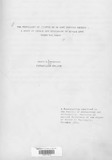| dc.description.abstract | This dissertation deals with the way Pokot respond to illness given their traditional forms of therapy and Western health services.
The Pokot view of the causation of illness is discussed and their notions regarding the prevention and treatment of illness outlined.
Various roles, both lay and specialist, in their health-seeking process are discussed.
In spite of concepts of health and illness shared by members of the society, it is shown that Pokot responses to specific illness are not fixed by custom but vary over time and space. The way their theory of illness facilitates these varied responses to illness is discussed. A number of factors which influence Pokot therapeutic actions and thereby contribute to variation in illness behaviour are identified viz: the perceived efficacy of a form of therapy, its accessibility, practicability, social and moral considerations ail of which are assessed by the individuals responsible for making the final decision about therapy.The dynamic relationship between traditional medicine and its
Western counterpart is examined. It is shown that the relationship is not simply one of conflict, but is a complex one involving competition, complementarity and supplementarity. A distinction is made between the cognitive, organizational and behavioural dimensions of the relationship.
It is argued that indigenous beliefs and practices are not necessarily the only obstacles to the extension of Western health services. The role of a low level of socio-economic development and certain national health policies are examined in as far as both hinder
the improvement of health conditions among Pokot The practical implications of the research findings for health planning in Kenya are considered. The suggestions made relate to the need to adopt an integrated approach to health development in which target populations participate fully, and indigenous resources utilized where possible and necessary. | en_US |



